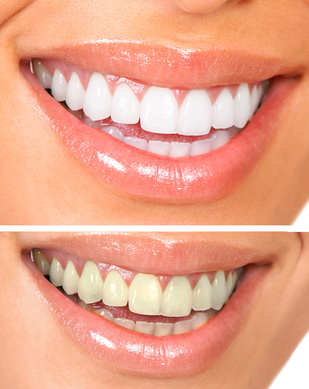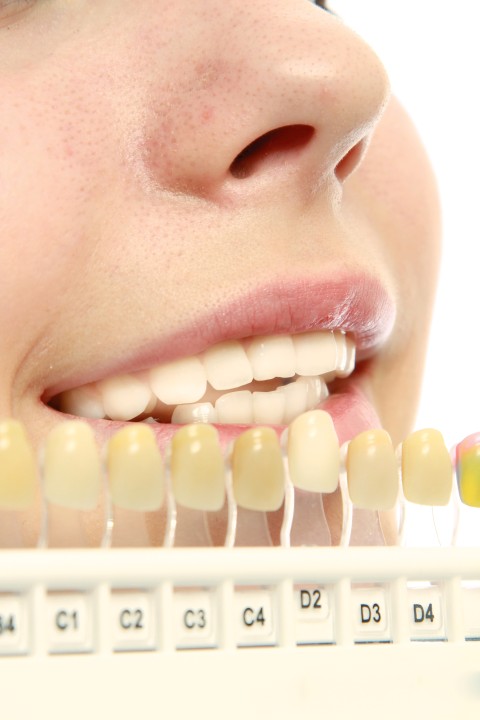
611 N. Broad Street, Lancaster, OH 43130
(740) 687-6105 | Appointments
(740) 687-6105 | General Information

A common cosmetic service, tooth bonding transforms flawed smiles into flawless ones. Bonding conceals a wide range of imperfections to display a white, uniform-looking smile. Like porcelain veneers and white restorations, cosmetic bonding is discreet and inconspicuous. For some patients, tooth bonding is a cost-effective way to achieve a vibrant smile in one office visit.
Bonding involves placing composite resin on teeth to conceal chips, stains, gaps, and cracks. As a minimally-invasive service, this cosmetic enhancement is often less expensive than veneers. Composite resin, the same material used to produce tooth-colored fillings, is a mixture of durable plastics and glass that are not only natural looking but also biocompatible. Your dentist will apply composite resin in liquid form to areas of the teeth that are flawed. A special light will then cure the composite resin where it will harden. After this process is complete, final adjustments such as polishing or filing the resin to ensure a smooth appearance may be necessary.
This cosmetic service is a popular method for filling in spaces between teeth or elongating the appearance of a chipped tooth. Like fillings, bonding is used to restore a tooth to its proper size and shape. Furthermore, the composite resin used in the bonding process is tinted to a custom shade of white so that it blends seamlessly with the natural color of your teeth. With precision, our skilled team of dentists will work to ensure that your smile enhancements look and feel natural so that your dental work is undetectable to others.
If you are interested in enhancing your smile through cosmetic bonding, we encourage you to schedule an appointment with our experienced dental team. At your consultation, we will assess the nature of your smile’s imperfections and how best to enhance the aesthetics of your smile.
Who wouldn’t want a whiter, more attractive smile? We understand that our patients are interested in feeling good and looking great, and whiter teeth have a lot to do with that! A smile that is clean and fresh can provide you with a pop of self-confidence and it can influence the way that others perceive you, both in your professional and your personal life. For millions of patients, the opportunity for a whiter smile can be obtained with the help of cosmetic dentistry and professional teeth whitening.
Specially formulated peroxide solutions are applied to the enamel to break up and bleach away the sediments that are known to discolor the teeth. These solutions may be self-activated, or they may require light or heat in order to be activated. Without altering or changing the structure of the enamel, these solutions deliver oxygen deep inside the outer layer of the tooth to eliminate the appearance of stains.
Bleaching or whitening the teeth is recommended whenever you have the desire for a whiter or brighter smile. Stains from coffee, tea, smoking, red wine, and berries can make your smile appear dull over time. If these stains cannot be removed with normal brushing or flossing, you may be interested in teeth whitening.
Often times, the aging process can take a toll on the brightness of your smile, causing the teeth to appear dull yellow or brown. Many of our mature patients are seeking whitening treatments in order to return to more youthful smiles.

We’ll be happy to offer our professional advice as to the method of whitening that will be safest and most effective for you. Choosing a professional solution will also ensure that the bleaching process is as comfortable and predictable as possible, yielding the results that will make you feel your best.
Why not contact us for a consultation to learn more about your options?
Do you suffer from a lack of self-confidence when you smile? Are your teeth damaged by decay and wear? Perhaps your teeth overlap one another or are permanently stained by years of exposure to coffee. Fortunately, you can achieve a healthy-looking, gorgeous smile with porcelain veneers—a cosmetic procedure that addresses almost every imaginable smile imperfection.
For patients looking to substantially improve the aesthetics of their smiles, porcelain veneers are a popular and viable option. Producing a flawless, celebrity-worthy smile, veneers offer a complete smile makeover that conceals a variety of smile flaws including chipped, crooked, and damaged teeth along with yellowing and stains.

Using high-grade porcelain which mimics the appearance of teeth by its color and ability to reflect light, veneers provide a complete smile transformation without looking unnatural or conspicuous. Individually crafted by trained dental technicians in a laboratory, each veneer is custom made just for you. The shape and size of veneers along with their shade of white is determined by carefully prepared specifications made by your cosmetic dentist.
With precision, our skilled dental team considers a variety of factors when designing the shape and size of your veneers such as the size of your teeth in relation to your gums, your face shape, and size of your mouth. After your veneers are crafted, they will be bonded to the front surface of your teeth with durable, tooth-colored cement. As these thin, shell-like pieces of porcelain are placed over your teeth, final adjustments will be made to ensure proper placement before the dental cement hardens. Patients will then leave our office wearing the smile of their dreams.
Like natural teeth, veneers are brushed and flossed regularly. Patients can still enjoy their favorite foods and most importantly, smile with confidence.
To learn more about porcelain veneers and cosmetic dentistry, contact our office today to reserve a one-on-one smile makeover consultation with our Friendly Dental Care team.
The portion of your tooth that extends above your gumline is subjected to tremendous pressure on a daily basis. Throughout your lifetime, the part of your tooth that is visible when you smile is vulnerable to tooth decay, various foods and beverages, sports injuries, clenching, and grinding. Under this kind of pressure, even the healthiest teeth can eventually break down, but it is comforting to know that your smile can be rehabilitated.
When the structural integrity of your natural teeth has been compromised, a crown is often the best way to rebuild and reinforce the teeth. A crown provides complete coverage of the tooth above the gumline and restores your chewing ability as well as your appearance. When the surrounding bone and the root of the tooth are otherwise healthy, a crown is the perfect way to preserve your tooth.
When you care for your crown as though it were a natural tooth, its lifespan is indefinite. It is not uncommon for a dental crown to last for 10 years, 20 years, or longer! Most dental crowns are fabricated from highly durable porcelains and ceramics, but may also be made from white gold and other metals.
To lengthen the life of you crown, you’ll need to keep it clean near the gumline and avoid any activities that would break or damage your natural teeth, as these activities could also harm your crown.
To make your crown, our dental team will use local anesthetics to numb the teeth and gums and then the dentist will slightly reduce the width and height of your natural tooth. If the tooth has deep decay or has been broken, it may first need to be reinforced with a strong filling material.
Once your tooth has been shaped and prepared, impressions will be taken to document the details of your teeth and gums, information that will be forwarded to the dental lab for the fabrication of your new crown. The new crown will be inspected and permanently cemented by the dentist, completing the process.
To get started, we encourage you to contact our office today and schedule your personal dental crown consultation.
Cosmetic dentistry encompasses a variety of procedures, including restorations like crowns and veneers, along with treatments such as teeth whitening, which improve the shade of the teeth. The goal of cosmetic dentistry treatment is to enhance the smile’s aesthetics and give the patient more confidence when they smile.
Cosmetic dentistry treatments are customized to meet the patient’s specific needs, and these interventions can be used individually or in combination depending on the patient’s smile goals. Patients who are interested in exploring how cosmetic dentistry may benefit them should schedule an initial evaluation to learn more about which treatments will be most helpful.
A dental crown is a tooth-shaped cap that is placed to repair a tooth that has been damaged by large areas of decay, a dental injury or extensive wear and tear. Dental crowns can be made of a variety of materials, including porcelain, ceramics or metals.
In order to place a dental crown, the dentist will first file down the tooth in order to accommodate the thickness of the crown. Any decayed tooth material will also be removed prior to crown placement. As with all restorations, dental crowns are custom-designed to blend in with the rest of the patient’s smile in terms of color and shape.
Veneers are thin tooth-shaped shells that are bonded to the front sides of a patient’s biological teeth to conceal a number of defects, such as chips, cracks, spaces between the teeth or deep stains that don’t respond to teeth whitening treatments. Veneers are typically made of porcelain, which has an appearance similar to natural tooth enamel.
After the porcelain is bonded to the tooth, it becomes quite strong and can last for up to a decade with proper care and maintenance. Additionally, veneers are impervious to staining agents, so they’ll retain their color over time. However, this also means that the color of veneers cannot be changed through teeth whitening treatments, so if you are considering that intervention as well, you should discuss the sequencing of veneers and teeth whitening with your dentist.
Increased tooth sensitivity can be a side effect of teeth whitening, especially if the patient receives multiple teeth whitening treatments. An existing issue of sensitive teeth can be of concern when planning for teeth whitening treatment, but it does not mean that the patient is automatically ruled out as a candidate. Your dentist can advise you of precautions that you can take to prevent tooth sensitivity, such as using a specially formulated toothpaste prior to your treatment.